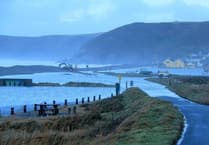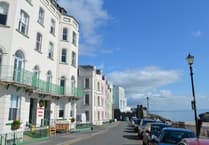More than 70 objectors turned out on Monday to greet officers and members of the Pembrokeshire Coast National Park Authority who were on a fact- finding visit to the Manorbier artillery range to judge for themselves the noise impact that military missile firing has on the village. In good humour and waving placards worded 'No firing after dark', the campaigners made a silent protest. "We were aware that we could not approach the committee, as one could at a normal site visit, to voice opposition to the application by ADR Manorbier to fire missiles during the hours of darkness, so we decided this was the best way to get our point across and show members the strength of feeling in the community," said anti- missile protestor Chas Cochrane. However, an objection was made to National Park development control officer, Cathy Milner, as Major Blaize Warburton, of ADR Manorbier, was giving his views and enforcing the MOD's case, which the protestors felt was one-sided. Mindful of this, NP chairman Richard Howells addressed the protestors, explaining that this was a fact-finding mission only, which the protestors accepted and thanked the chairman for his comments. The site meeting was covered by both ITV and BBC television, who showed interviews and clips of the visit on their respective news programmes that evening. Organisers of the pressure group were pleased with the numbers that turned out, but were disappointed that only seven or eight members of the National Park committee visited the site to experience the missiles fired first-hand. They were also concerned that the weather conditions on the day were somewhat unusual in that the wind was blowing from a northerly direction. "The prevailing winds are normally south-westerly, which brings the noise onshore towards the community," explained Mr. Cochrane. Members of the committee listened to the missiles outside the Youth Hostel, then in one of the dormitories, and finally in Dewing Avenue on the Skrinkle estate, while a noise consultant took readings with sound monitoring equipment. A fourth one was due to have been listened to from Lydstep, but the committee decided that this was not necessary. "We'd like to thank Matt at the Manorbier YHA for organising coffee for members of the public and MOD officials while waiting for the committee to arrive, which demonstrates the friendly spirit in which we are fighting the campaign," remarked Mr. Cochrane. "We are not against training, only where this training takes place. Because of the effects of the noise made by these missiles, Manorbier is no longer an appropriate site, especially for firing after dark, being in close proximity to a large community," he added. In the light of Monday's meeting, it is now expected that the National Park will make their decision on the MOD decision to resume night firing at their meeting in April. "It is unlikely that the application will be fully considered until the April meeting of the National Park Authority's development management committee," said a National Park spokesman. "The MOD have been taking further readings which still require analysis. These will then be considered by the authority's own noise consultant who was present at the meeting. "The visit was very useful and informative. We are grateful to all involved for their help and to those who turned out to make their points known."




